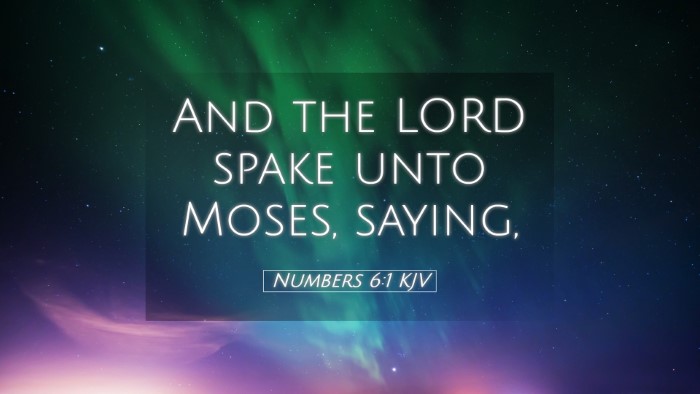Commentary on Numbers 6:1
Verse Context: Numbers 6:1 states, "And the Lord spake unto Moses, saying," marking the initiation of God's instructions concerning the Nazirite vow. This passage is pivotal as it introduces a unique form of consecration in the Israelite community.
Introduction to the Nazirite Vow
The Nazirite vow is an extraordinary commitment characterized by specific prohibitions and obligations, serving as an indication of an individual's deep dedication to God. Various commentators have elaborated on the significance of such dedication.
Insights from Commentators
Matthew Henry
Matthew Henry remarks on the significance of God's voice in this passage, noting that divine communication is crucial for understanding the responsibilities of the Nazirite. He emphasizes the personal element of the vow, suggesting that Nazirites set themselves apart from the common Israelite population, thus exemplifying sincere devotion.
- Separation for Service: Henry underscores that the Nazirite vow is a calling for separation from worldly influences, illustrating how this separation is a divine command rather than a mere personal choice.
- Vow of Dedication: He elaborates on the significance of the vow itself, highlighting how it reflects an earnest desire for holiness and service, much needed in both ancient Israel and today's church.
Albert Barnes
Albert Barnes provides a thorough Exegesis of the passage, focusing on the ceremonial aspects of the commitment involved in the Nazirite vow. He states that the Nazirite's separation is akin to a holy calling, echoing the call of the prophets.
- The Nature of the Vow: Barnes explains the implications of the vow, emphasizing not only abstinence from wine and cutting of hair but a total commitment to God’s presence. This underscores the seriousness with which God treats personal dedication.
- Types of Personal Holiness: Barnes correlates the Nazirite experience to New Testament believers' calls for holiness, encouraging current believers to seek a similar commitment to serve God fully.
Adam Clarke
Adam Clarke offers a keen insight into the historical and cultural context of the Nazirite vow. He notes that the vow was often taken in times of trouble or intense devotion, rendering it not only a personal vow but a communal symbol of reliance on God.
- Historical Context: Clarke elaborates on historical figures who embraced the vow, such as Samson and Samuel, emphasizing how these narratives add depth to the understanding of a Nazirite's commitment.
- Modern Relevance: He draws parallels between the ancient practice of the Nazirite vow and contemporary Christianity, suggesting that while the vow itself may not be commonly practiced today, the underlying principles of dedication, separation, and holiness are eternally relevant.
Theological Reflections
It is essential to reflect theologically on the implications of the Nazirite vow within the broader context of God’s redemptive work. The vow can be seen as a foreshadowing of Christ’s ultimate sacrifice, where separation for the sake of holy service culminates in the fulfillment of God's law and grace.
Cultivating a Vow of Holiness
Both the ancient practice and new interpretations emphasize an active pursuit of holiness among believers. The commitment outlined in Numbers 6:1 calls modern Christians to a deep introspection regarding how they define their relationship with God.
- Dedication to God: This passage challenges believers to consider how they can carve out spaces in their lives dedicated exclusively to God.
- Reflection and Response: It invites believers and scholars alike to contemplate their uniqueness and sacrifice in a world often at odds with spiritual commitment.
Conclusion
The insight from Numbers 6:1 transcends its historical context, beckoning both scholarly inquiry and personal reflection. The call to holiness and separation echoes through time, inviting not only pastors and theologians but every believer to engage fully with God’s transformative grace.


